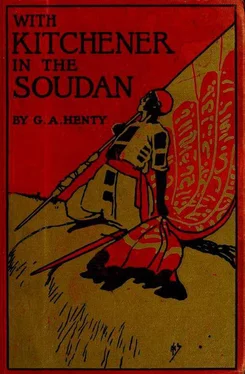The 21st Lancers scouted ahead of the British brigades to discover if any foe were lurking behind Surgham Hill. When about half a mile south of the hill they saw a small party of Dervish cavalry and some infantry, who were hiding in what looked like a shallow water-course. The four squadrons rode forward at a gallop. A sharp musketry fire opened upon them, but without hesitation they dashed headlong at the Dervishes, when they found that, instead of a hundred and fifty foemen as they had supposed, some fifteen hundred Dervishes were lying concealed in the water-course. It was too late to draw rein, and with a cheer the cavalry rode down into the midst of the foe. There was a wild, fierce fight, lance against spear, sabre against sword, the butt-end of a rifle or the deadly knife. Some cut their way through unscathed; others were surrounded and cut off. Splendid feats of heroism were performed. Many of those who got over returned to rescue officers or comrades, until at last all the survivors climbed the bank.
The brunt of the fighting fell upon the two central squadrons. Not only were the enemy thickest where they charged, but the opposite bank of the deep nullah was composed of rough boulders almost impassable by horses; these squadrons lost sixteen killed and nineteen Avounded. Altogether twenty-two officers and men were killed and fifty wounded, and there were one hundred and nineteen casualties among the horses. Once across, the survivors gathered at a point where their fire commanded the water-course, and, dismounting, speedily drove the Dervishes from it. On examining it afterwards it was found that sixty dead Dervishes lay where the central squadrons had cut their way through.
The charge in its daring and heroism resembled that of the 23rd Light Dragoons at Talavera. The fall into the ravine on that occasion was much deeper than that into which the Lancers dashed, but it was not occupied by a desperate force; and although many were injured by the fall, it was in their subsequent charge against a whole French division that they were almost annihilated.
Both incidents were, like the Balaclava charge, magnificent, but they were not war. A desperate charge to cover the retreat of a defeated army is legitimate and worthy of all praise even if the gallant men who make it are annihilated, but this was not the case at Talavera nor at Omdurman. It was a brilliant but a costly mistake. The bravery shown was superb, and the manner in which officers and men rode back into the struggling mass to rescue comrades beyond all praise; but the charge should never have been made, and the lives were uselessly sacrificed.
As yet all was quiet at other points. Bodies of the enemy could be seen making their way towards Omdurman. The battery opposite the town had from early morning been keeping up a fire from its heavy guns upon it, but, save for the occasional shot of a lurking Dervish, all was quiet elsewhere.
While the cavalry charge was in progress Gregory had moved along the line of the Egyptian brigades with General Hunter. Suddenly, from behind the hills where the Khalifa had fallen back with his defeated army, a column of fully twelve thousand men, led by the banner-bearers and emirs, poured out again. A strong body sprang forward from another valley and made for the south-eastern corner of Mac-donald's brigade, which had moved almost due west from the position it had occupied in the zareba, while the large force that had chased away the Egyptian cavalry were seen returning to attack him in the rear. General Hunter, who was riding between Macdonald's and Lewis's brigades, which were now a good mile apart, exclaimed to Gregory, who happened to be the nearest officer to him, " Ride to Macdonald and tell him to fall back if possible!" Then he turned and galloped off to fetch up reinforcements. But the need was already seen, the sudden uproar had attracted the attention of the whole army, and the Sirdar instantly grasped the situation. The moment was indeed critical. If Macdonald's brigade were overwhelmed it might have meant a general disaster, and the Sirdar at once sent orders to Wauchope's brigade to go at the double to Macdonald's aid.
Fortunately Colonel Long, who commanded the artillery, had sent three batteries with Macdonald's brigade. Collinson's brigade were far away near the river, Lewis's were themselves threatened. It was evident at once that no assistance could reach Macdonald in time. When Gregory reached him the Dervishes were already approaching.
" It cannot be done," Macdonald said sternly, when Gregory delivered the message; "we must fight!" Indeed, to retreat would have meant destruction. The fire would have been ineffective, and the thirty thousand fierce foes would have been among them. There was nothing to do but to fight.
Macdonald had marched out with the 11th Soudanese on his left, the 2nd Egyptians in the centre, and the 10th Soudanese on the right—all in line; behind, in column, were the 9th Soudanese. The last were at once brought up into line to face the advancing enemy. Fortunately, the Sheik Ed Din's force was still some little distance away. The batteries took their place in the openings between the battalions, and the Maxim-Nordenfeldts were soon carrying death into the advancing foe, while the Martini-Henry with which the black and Egyptian troops were armed mowed them down as by a scythe. The Soudanese battalions fired, as was their custom, individually, as fast as they could load; the Egyptian battalion by steady volleys. Still the enemy pressed on, until they were within two hundred yards of the line. The emirs and other leaders, Baggara horse and many spearmen, still held on until they fell a few feet only from the steady infantry. The rear ranks of the Dervishes now began to fall back, and the desperate charges of their leaders grew feebler; but Ed Din's division was now within a thousand yards. Macdonald, confident that the main attack was broken, threw back the 9th Soudanese to face it, and wheeled a couple of his batteries to support them.
The already retreating Dervishes, encouraged by the arrival of Ed Din's division, returned to the attack. The 11th Soudanese swung round to aid the 9th in their struggle with Ed Din's troops. The charges of the Dervishes were impetuous in the extreme. Regardless of the storm of shell and bullets they rushed on, and would have thrust themselves between the 9th and 11th had not the 2nd Egyptians, wheeling at the double, thrown themselves into the gap. The Dervishes pressed right up to them, and bayonet and spear frequently crossed; but in a fight of this kind discipline tells its tale. The blacks and Egyptians maintained their lines steadily and firmly, and against these individual effort and courage even of the highest quality were in vain. The ground being now cleared, the gun-boats opened with Maxim and cannon upon the rear of the Dervishes. The camel corps coming up, each man dismounted and added his fire to the turmoil; and finally three of Wauchope's battalions arrived, and the Lincolns, doubling to the right, opened a terrible flank fire. The Dervishes broke and fled, not, as usual, sullenly and reluctantly, but at full speed, stooping low to escape the storm of bullets that pursued them.
Zaki had throughout the day kept close to Gregory, ready to hold his horse when he dismounted; but, quick-footed as he was, he was left behind when his master galloped across to Macdonald. He was up, however, in the course of a minute or two, and Gregory was glad to see him, for the horse was kicking and plunging at the roar of the approaching enemy, and was almost maddened when to this was added the crash of the batteries and musketry.
"Put my blanket round his head, Zaki," Gregory said when the black ran up; " wrap it round so that he cannot see. Hold the bridle with one hand and stroke him with the other, and keep on talking to him; he knows your voice. I don't want to dismount if I can help it, for with my field-glasses I see everything that is taking place, and I will tell you how matters are going."
Читать дальше












